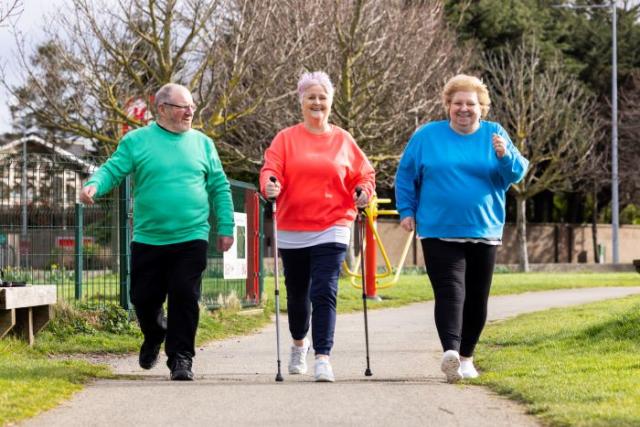People with COPD, or Chronic Obstructive Pulmonary Disease, are being urged by COPD Support Ireland to “Step Up and Step Out” this World COPD Day, Wednesday November 15, and take part in a virtual COPD exercise masterclass.
The online event, which will be streamed live on the day at www.copd.ie, will feature exercise coaching, physical activity challenges, and presentations from experts with lots of tips on how to stay active. It is taking place from 12 midday to 2pm as part of the World COPD Day Big Baton Pass, which sees Ireland among ten countries from around the globe taking part in a live broadcast to mark the day.
As part of the occasion, people with COPD and their supporters are also being encouraged to take part in the COPD Step Challenge. Those interested are asked to register their challenge, choose an activity – for example, walking, stair-climbing, running, even dancing – and set a target number of steps, individually or as part of a group. The overarching aim is to register a total of 380,000 steps, or one step for every person thought to have COPD in Ireland.
To take part in the COPD Step Challenge, and receive a challenge pack of tee shirt, pedometer, and water bottle, visit www.copd.ie.
ABC of COPD
COPD, or Chronic Obstructive Pulmonary Disease, is perhaps more commonly known as chronic bronchitis or emphysema. It arises where there is airflow obstruction in the airways of the lungs leading to shortness of breath. Smoking accounts for most cases. However, it can also arise from being in an environment where there is exposure to smoke, dust or fumes, or where a person is living with an existing condition such as chronic asthma or has a family history of certain lung-related illnesses.
Latest figures from the National Healthcare Quality Reporting System 2021/2022 estimate that there are 380,000 people living with COPD in Ireland, yet less than a third of these have been formally diagnosed. Unfortunately, at least 1,500 people die here each year of COPD, while over 15,000 people are admitted to hospital with the disease.
Against this backdrop, COPD Support Ireland is urging people to get checked out if they answer yes to the “ABC” of COPD:
A – are you Age 35 and over?
B – are you experiencing ongoing Breathlessness?
C – do you have a Cough that won’t go away, with or without phlegm?
Importance of Early Diagnosis
For Prof. Tim McDonnell, consultant respiratory physician and chairperson of COPD Support Ireland, the welcome news is that we can now identify the likelihood of COPD at a much earlier stage:
“The Global Initiative for Chronic Obstructive Lung Disease, or GOLD, is this year highlighting the importance of early lung health, early diagnosis and early interventions, as part of its World COPD Day activities. The good news is that we are now in a position to identify COPD earlier thanks to the spirometry breathing test. The sooner COPD is diagnosed and treated, the better the chances of preventing or delaying it from developing into severe COPD.
“Unfortunately, we know from a survey conducted by Behaviour & Attitudes late last year that while seven in ten (68%) people here have heard of COPD, almost nine in ten (88%) know little or nothing about it. Indeed, one third (35%) were unable to identify any symptoms associated with the condition. I would encourage people to get to know the ‘ABC’ of COPD and, if this applies to them, to visit their GP for a spirometry lung check to assess their breathing.”
For Joan Johnston, General Manager of COPD Support Ireland, physical activity is a vital part of maintaining health for people with COPD:
“It is well-documented that maintaining or increasing physical activity levels in day-to-day life can improve the symptoms of COPD. In fact, apart from quitting smoking, it is the single most important thing that we can do. That’s why this World COPD Day we are encouraging people with the condition to Step Up and Step Out for COPD. Breathing is life and, the earlier we act, whether it’s in terms of getting symptoms checked out, or managing our condition once diagnosed, the so much better our quality of life will be.”
STEPPING UP AND STEPPING OUT – Top Five Tips for People with COPD
- Home STRETCH! Many people with COPD find that coping with breathlessness is one of the hardest things about their condition. They are often concerned that physical activity may make their breathlessness even worse, causing them to think twice about taking part. However, this is a vicious cycle, as the less you do, the less you are able to do, while the more you do, the more you are able to do. Done in a safe way, exercise is one of the best things that we can do to improve our breathing as it makes our muscles stronger so that they need less oxygen. For a step-by-step guide to exercises such as arm wings, step-ups, sit-to-stand movements, and wall presses, check out COPD Support Ireland’s COPD & Me booklet at www.copd.ie/copdandme
- Class ACT. To help you better manage your COPD, improve your fitness and enhance your quality of life, why not speak to your healthcare professional about being referred to a HSE pulmonary rehabilitation programme in your area? These exercise self-management programmes, usually over six to eight weeks, are run by physiotherapists supported by healthcare colleagues, and cover everything from aerobic exercises to nutrition. With activity tailored to your needs and ability, your oxygen level, heart rate and blood pressure will be monitored throughout for added peace of mind. To maintain the progress you’ve made once finished, why not join one of the 42 COPD Support Ireland support groups nationwide and take part in organised exercises classes provided by trained professionals – check out www.copd.ie/support-groups
- Goal SETTER. A goal gives us focus and helps to keep us motivated. When we achieve a goal, it makes us feel so much better. Plan regular activity into your routine to keep your fitness levels up. Think of ways to keep yourself active during the day, whether it’s doing home exercises, a spot of gardening, walking to the shops, or visiting a neighbour. Of course, it’s important that the goal be achievable and enjoyable, and bigger goals should be broken down into smaller ones, so that we can more easily see progress made and build up our confidence. It’s also important to pace yourself and develop activity levels gradually. Speak to your health professional about the type, frequency and intensity of exercise that is right for you. Indeed, why not find a buddy who will join and support you in your efforts? Of course, we all have good and bad days, so, remember, if at first you don’t succeed, try and try again!
- Energy Efficient YOU. When energy levels are at a premium, there are practical steps that we can take to maximise our activity levels across the day, maintaining a balance of work, rest and play. To do this, all we need to do is to follow the Four Ps – Prioritise, Pace, Plan and Posture. Prioritise by making a list of tasks in order of importance, getting rid of unnecessary activities and delegating where possible. Pace yourself by adopting a slow and steady routine, alternating between heavier and lighter tasks, and allowing plenty of time for rest and relaxation. Plan your world by putting frequently-used items where they are easy to reach, use a bag or basket to carry things, and sit rather than stand where possible. Posture should be considered and you are advised to avoid bending, reaching or twisting, push or pull over lifting objects, use your legs rather than your back, and minimise arm movements.
- Pucker UP. Many daily activities for people with COPD, such as getting dressed, climbing the stairs, or doing jobs around the house, can give rise to breathlessness. Pursed lip breathing exercises help control your breathing and prepare you so that when you are finding it hard to breathe, you won’t panic and worsen your breathlessness. Simply pucker or purse your lips, breathe in slowly through your nose, counting to two, and then breathe out through your pursed lips while counting to four. Your breathing should soon settle.
For more information on COPD, supports and services, visit www.copd.ie or telephone COPD Support Ireland on 086 041 5128. If you have a question about living with your own COPD diagnosis, you can also call the COPD Adviceline on Freefone 1800 832 146, Monday to Friday, 9am to 5pm, to make an appointment to speak with a COPD specialist nurse or physiotherapist.







